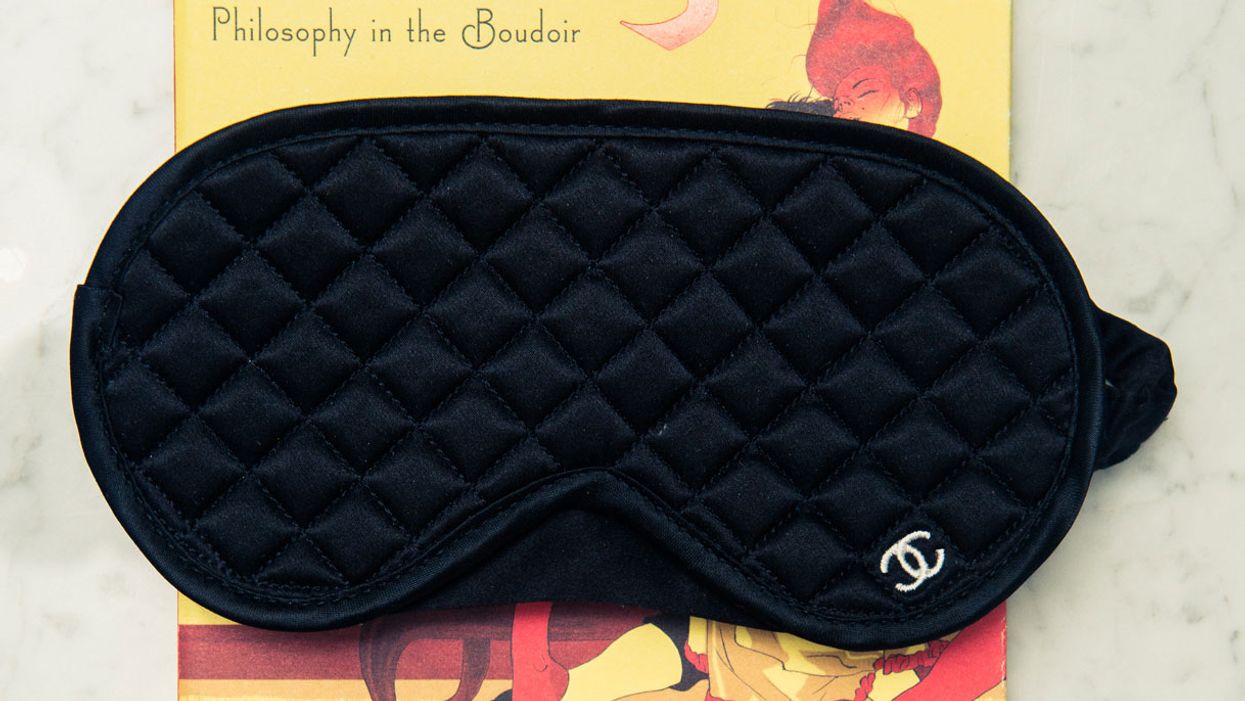The Truth About Beauty Sleep
FYI: It’s real. Everything you need to know to tighten, brighten, and Benjamin Button overnight.

Okay, so we, too, always thought “beauty sleep” was just a melodramatic excuse manufactured on the silver screen and characterized by middle-aged women trying to justify squeezing in more than the prerequisite eight hours of sleep per night. But IRL, according to just about every dermatologist and our Holy Wellness Bible, Goop, the term holds true to its name.
Between an already hectic work-life schedule and the obvious life priority that is the new season of OITNB, that eight hours of sacred shut-eye falls to the wayside faster than our The Bachelor love affair. Hence the necessity for making the most out of those limited hours of natural regeneration with, uh, the addition of unnatural activities. Nothing like an in-bed face and hair masks to bring out your inner natural beauty, right?
Committed to the cause, we turned to the names behind some of our favorite skin and hair care products to school us in the science of sleep, and all of the best treatments and techniques to tighten, brighten, and Benjamin Button your face and hair overnight. Trust us—your 32-yet-soon-to-look-25-year-old skin will thank you later. Promise.
How Getting Extra Z’s =
Healthy Skin & Hair
“I believe in the term ‘beauty sleep’ because a good night’s sleep really does aid in beautiful skin. Sleep reduces cortisol (a stress hormone) and increases melatonin (an antioxidant), which helps promote cellular turnover, improving skin texture and tone.” —Kate Somerville, Founder, Kate Somerville Skincare and Skin Health Experts
“What we know is that the body is in a ‘repair and replenish’ mode during sleep, and this is true of the skin as well. The evening hours are therefore critical for skin, as it is in regeneration mode. Blood flow increases, as does skin’s capacity to repair DNA. Epidermal cell proliferation is also higher in the evening, all in all meaning that skin is in more of a regenerative state.” —Dr. Jacqueline Hill, Director of Strategic Innovation & Science, La Prairie
NIGHTTIME HYDRATION
“Trans-epidermal water loss progressively increases during the night, as does the skin’s temperature. This means that while the skin is more prone to losing moisture and becoming dehydrated, it is also more apt to absorb the treatments applied during this time frame. Nighttime hydration plays a crucial role in keeping skin healthy, radiant, and youthful. We recommend seeking out products that combine hydrators to enhance skin’s natural moisture matrix, plus powerful anti-agers that are targeted to your specific skincare concerns.”- Dr. Hill
OVERNIGHT REFRESH
“In a general sense, nighttime creams and overnight masks help to support the regenerative processes in the skin. This includes helping the skin to recover from the daily environmental aggressions. Nighttime creams and overnight masks can help stimulate the skin’s self-defense mechanism and boost the skin’s own natural antioxidant systems. It is a time to regenerate, repair, and detoxify.” —Dr. Jacqueline Hill
DE-STRESSER
“At night, hair is undisturbed by all of the stressors of a day’s work (heat styling, product, etc). Overnight is when these beneficial ingredients can truly absorb into the hair and give you the best results! Living Proof Perfect Hair Day Night Cap Overnight Perfector is a weightless, fast-absorbing treatment that makes hair more manageable, shinier, and healthier for up to five shampoos. What’s unique is that it can be applied on dry hair at bedtime, with no need to rinse out in the morning. Because Night Cap doesn’t contain any oils or silicones, it can be applied to fine hair without the worry of making it flat or oily. In fact, because of the unique, lightweight blend of amino acids, it is actually a very effective way to condition and protect even the finest hair.” —Tim Rogers, Creative Director, Living Proof
IF YOU HAVE OILY SKIN:
“For those who are prone to acne or have oilier skin, the skin secretes more oil at night, which can clog pores and create pimples. Leaving a salicylic acid product on the skin overnight can help to dry out and reverse the effects of this over-production of oil, thus helping acneic conditions. Sulfur is an ingredient that has the unique ability to draw oil out of the skin into the sulfur molecules, which can then be washed away. This will not only help with oily deposits, but also shrink pores. It does this in a way that it is not stripping, however, so there is no rebound of increased oil production.” —Dr. Dennis Gross, Owner, 900 5th Dermatology; Founder, Dr. Dennis Gross Skincare
IF YOU HAVE COMBINATION SKIN:
“A combination skin person should be thought of as having a hybrid of two types of skin: oily areas should be treated with a mask, while dry areas can use an oil-free moisturizer. If your skin is dry in certain areas, like the cheeks, but continues to be oily in other areas, such as your forehead, nose, and/or chin, don’t be afraid to mix up products and apply them to different areas of the face.” —Dr. Gross
HERE’S WHAT YOU SHOULD DO:
FOR YOUR SKIN
GET IN A ROUTINE
“Make sure you are removing all product/makeup before bed! At my Skin Health Experts clinic on Melrose Place, we promote the double cleanse to ensure makeup and impurities are fully removed. You can cleanse twice or use a makeup removing towelette (use both front and back) followed by a cleanser. If you consistently sleep in makeup, you’re actually aging yourself, as it dries out and cracks your skin. Mascara dries into lashes and makes them brittle. Needless to say, proper cleansing is a crucial step before bed!
1. Cleanse: Make sure to double-cleanse to fully remove makeup and impurities.
2. Exfoliate: 2-3 times a week and preferably in the shower with steam.
3. Hydrate: Use a product with hyaluronic acid.
4. Treat: Optional—incorporate serums or treatments.
5. Moisturize: Lock in hydration.” —KS
HUMIDIFY
“Using a humidifier at night when the air is dry due to less moisture in the atmosphere—especially during the colder winter months along with the usage of household heaters—can be very beneficial to the skin. One of the reasons skin becomes dehydrated is because skin loses moisture to the atmosphere through evaporation. That loss of water into the air is reduced when there is abundant moisture in the air, which is the goal of a humidifier. I also love hyaluronic acid as an overnight ingredient because it draws in moisture as you sleep. Our Moisture Cushion is amazing to use as a nighttime hydrator.” —Dr. Gross
“We naturally lose moisture while we sleep, which can result in puffy eyes, dark circles, or a lackluster complexion. It’s really important to hydrate both internally by drinking plenty of water during the day and before bed, and externally by looking for products that contain hyaluronic acid, which carries 1000x its weight in water.”—KS
EXFOLIATE
“Exfoliating is crucial for a glowing complexion, as it removes dead, dry skin and allows the products you apply afterward to penetrate deeper for maximum results. I always follow with my DermalQuench Liquid Lift—it gives skin an instant boost of hydration and plumps fine lines and wrinkles for a smooth, refreshed look.” – KS
GET YOUR VITAMINS
“Vitamin C is best applied at night because of its regenerative properties. Aside from the decreased efficacy when exposed to sunlight, it is also recommended at night rather than in the AM because it builds collagen, is a potent antioxidant, and its properties are best applied when they can be left overnight.” —Dr. Gross
“There are many products that are susceptible to sunlight, like retinol and Vitamins C & E, so it’s best to use them in the evening as they will stay active on your skin longer.” —KS
SWAP YOUR SLEEPING HABITS
“Sleeping on your back is actually the best position to preserve a youthful-looking complexion. In fact, stomach and side sleepers (especially those who favor the same side every night) actually run the risk of getting lines as a result of their nocturnal habits. This is because persistently pressing our faces into a pillow causes trauma to the skin. Over time, this trauma, aggravated by the friction of a cotton pillowcase, can create permanent creases as our collagen breaks down. In addition, the weight of our faces impairs circulation to the part we have pressed to the pillow, which compromises the skin’s regenerative abilities. If you cannot sleep on your back, which takes the pressure completely off the face, try covering your pillow with a satin pillowcase to minimize friction. While there still can be a slight amount of abrasion, the skin will slide more easily over satin than cotton.” —Dr. Dennis Gross
THE MORNING AFTER
“In my opinion nighttime cleansing is most important, but a quick rinse with a drop of cleanser is advisable in the morning. Overnight your skin collects oil and will appear dull when you wake up. A tiny amount of cleanser will give you the clean surface you need for the best application of moisturizer and makeup.” —Dr. Gross
Here’s What You Should Do:
For Your Hair
MASSAGE
“A 60-second scalp massage stimulates the blood capillaries in the scalp, contributing to healthy hair growth as you rest!” —TR
USE SILK INSTEAD
“A silk pillowcase can prevent the hair cuticle from being roughed up, so you can wake up to less frizzy hair and with fewer tangles. [For curly hair], bring back the velour scrunchie! It can gently hold the hair in place, avoiding any disturbance that creates style chaos in the morning.” —TR
DON’T THROW INTO A PONY
“Whilst it’s not bad to sleep with wet hair, I would avoid tying hair up in a ponytail or a bun whenever it’s wet. Hair can stretch when wet, only to contract when it’s dry. If the hair is anchored in place as it dries, it can cause tension and breakage.” —TR











